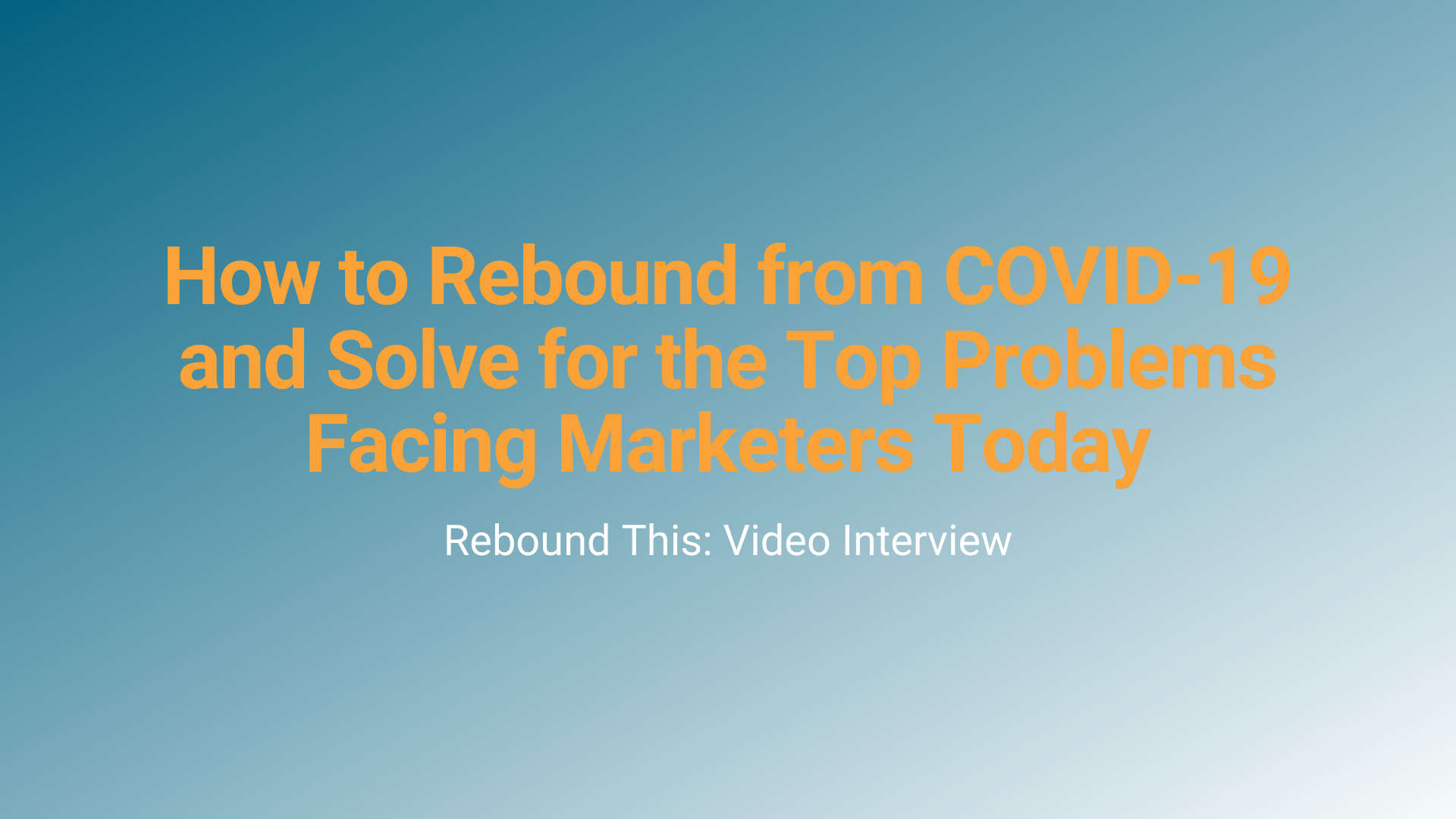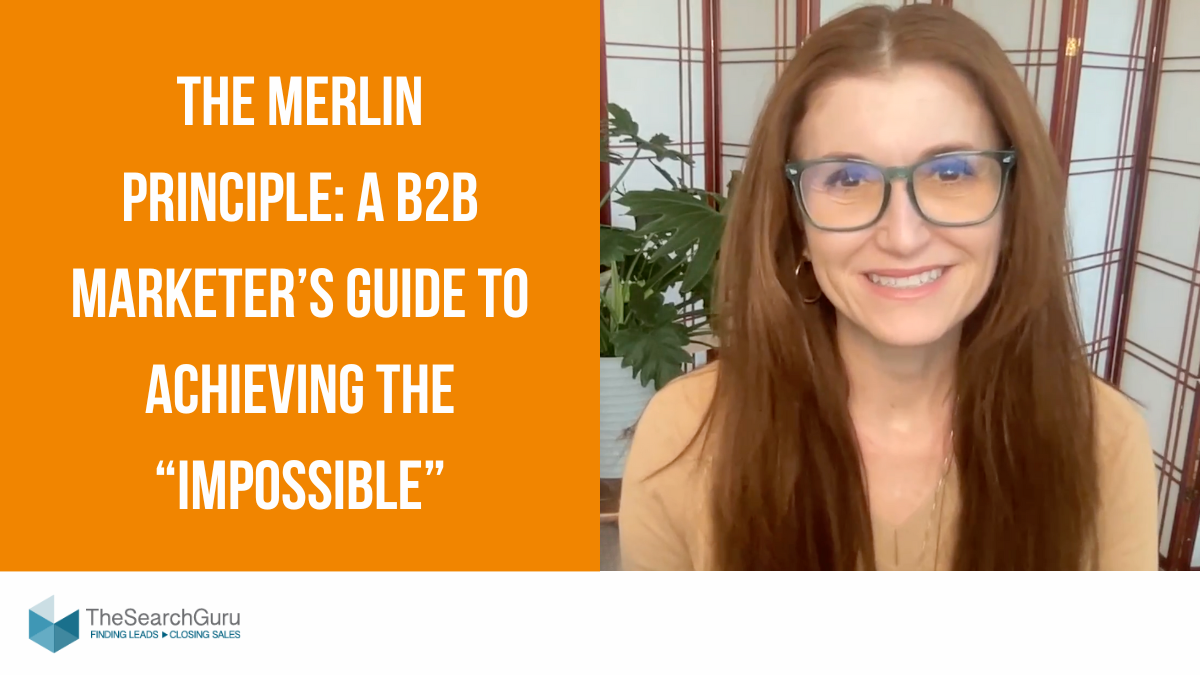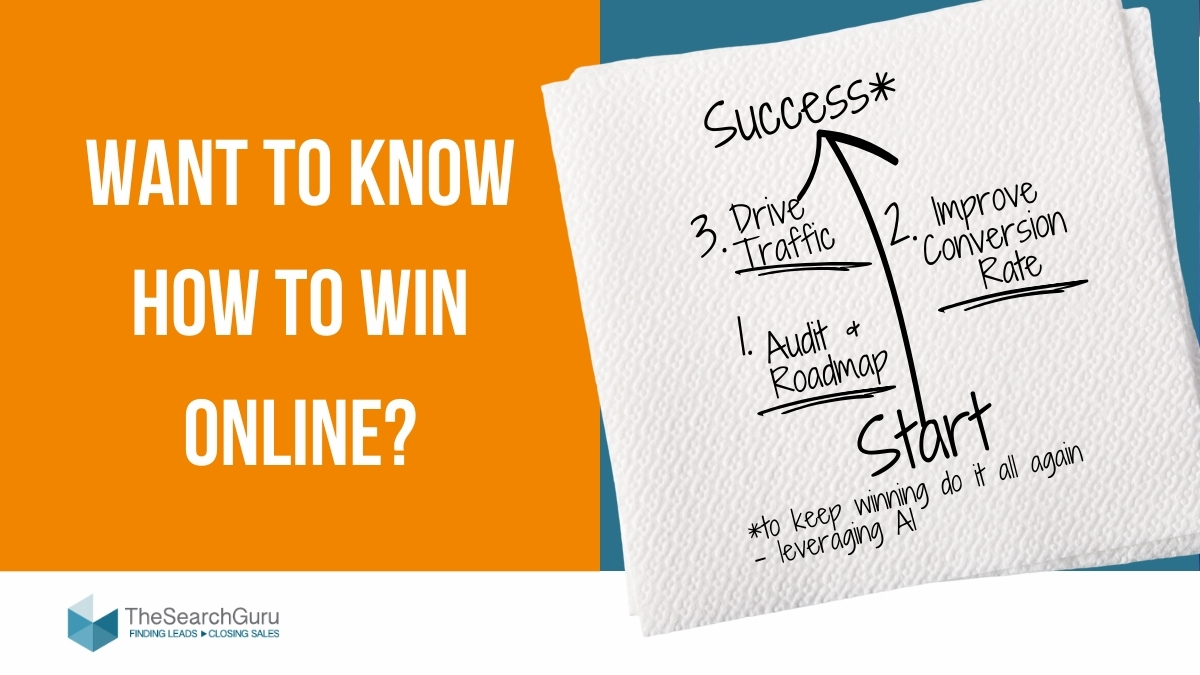A #ReboundThis Video Interview with Matt Sweeting, Marketing Automation Expert from Sharpspring.
Matt Sweeting: I kind of have a unique vantage point in in terms of our company because I work with so many different partners. And I’ve seen a lot of success. I’ve seen a lot of frustration. I’ve seen people, as you said, you know, make good things from a bad situation. I’ve also seen people take good situations and light them on fire, and all points in between, and I’m happy to, to walk through any and all of them in this this time in our lives, and just this moment is definitely something that’s unique. It has produced a lot of, you know, interesting things, you know, some positive, some really negative. I mean, you know, I think that there’s a ton of challenges. So not only thinking about the idea of transitioning closer to what we had prior to March, right, at least in the in the US, but but also just like, I liked how you positioned it in some of your initial outline what, you know, some of the things that we’ve learned from something like this because it’s, it’s been interesting because I think that to me, the biggest outcome for for us here at sharp string has been, you know, we would have never looked as internal as we have because of this. Now, I’m not saying that that, you know, it’s just, we’re just so we’re always progressing. We’re trying to always move forward. And this has given us a really nice moment to pause, look internal, right, kind of do some auditing that we weren’t doing up until then really start to prioritize what your day to day was right and really, not really micromanage, but it just in the sense of what are your tangible goals and we Become a lot better at articulating that. Right. And I think that that’s been because the the enormities that you had are just gone, at least for us. You know, one of the things that I personally really liked about sharp spring and one of the reasons I stay working here as I’m a people person, right, just at heart I, we’ve talked about this, you and I, a bunch of times, I kind of thrive off the if the interaction right that people have and while we can absolutely maintain that connection via the meetings that such as the one we’re having right now, up to me, there’s such a nuance to just physical presence, you know, I mean, a lot of what I do is reading a room, right, riffing on a situation understanding how to kind of move the moment, right, whether that’s internally or working with our partners because I do a lot of on site stuff too. So one of the things that I really like is that we are all located here in Gainesville, right? in Florida. We’re all vertically integrated, right? So it’s from, from Dev, to sales to leadership to support to training, right? We’re all here. We’re all in the same building. Now, I love that dynamic. And I still do, because I can walk over to someone and assist with a problem without having to reach out and make time and things like that. Right. So while some people view that as inefficient, I personally think it’s tremendous as an asset because I like just the consistency that it affords. So if I’m working with someone, and they’re having an issue in a different area of the company, I’ll just go over and engage them in the moment. Right. Same thing with if somebody is having an issue with a partner. It’s something that I either have history with or I have worked with them previously. I’m happy to always jump in and I think that kind of fluidity really reinforces Is the customer experience, at least I hope it does for our partners, but also for me, I think that that connectivity is what allows me to be more successful in what I do. Right. So I like that dynamic. I will say that this has obviously changed all of that. I’m a lot more at ease now being separated from people, I feel like I can still contribute being remote. And it’s been really compelling to see how productive we still are when we are siloed. So one of the things that I have found is that we can still progress in a way that is really productive, and we could still get a lot done. We just do it in kind of a different capacity. So that’s been really reassuring, in a lot of ways. You know, obviously, when this started, there was just a massive dip, right? I mean, I think everyone experienced that. I don’t know I’m sure someone did well. But that first month, I’d say mid March to mid April was just tough, right? really hard for us. Mostly just getting our sea legs because we didn’t know what we were doing. Everything just really happened so quickly. So and it was nothing we were planning for. So pivoting and moving in that direction was really challenging. Oh, obviously, all of our partners are in the same boat. One of the things that has been, you know, reassuring with all of this is that there’s a commonality and experience, you know, there’s not a lot of things that happen in your life on the scale of what this is. And so one thing that’s been that’s made it a little bit easier is that everyone you talk to is experiencing the same relatively the same thing. And again, there’s not a lot of, there’s not a lot of that traditionally things like that would be you know, natural disasters, right. So if it’s cold or there’s a storm or something but the country is so vast domestically that there isn’t going to be that kind of consistency or, you know, if there is an economic downturn in one part of the country, maybe it’s not so pronounced and another, this is, you know, was non discriminatory, right? It happened universally, everyone was kind of forced to make the same amends. And so in some ways, I think that was really reassuring that kind of the hive or crowd mentality kind of made it easier, I think, to make that transition. But that first month was really tough. I felt like we were a little bit clunky with our maintenance. I think a lot of our partners were struggling, both personally and professionally. And so and we were right there with them, you know, trying our hardest to pivot. I mean, obviously, we were doing a lot of things on the marketing side that were more tangible, but doing all these city events and just trying to be a little more face to face because we thought that interaction was really productive. And we’ve gotten a lot of great feedback on it. Obviously, that wasn’t really possible anymore. So we had to shut that program down, move in a different outreach direction. A lot of our sales team, right obviously felt a lot of the hit because there was so much uncertainty. People were really apprehensive to move forward, understandably so. Right. So again, we had to reconfigure our expectations, so many people who were doing well, we’re all of a sudden put in more precarious situations. So even agencies that were successful, you know, definitely had a moment of apprehension because they didn’t know their clients. Also, we’re fueling all of this so that, again, I’d say that first month, really three weeks or just very touch and go. Obviously, as a company, you know, we’ve had really great leadership from our CEO and all of our leadership team, really, which has been a, I think a really productive thing. Obviously, they had to make some initial concessions, we had to reconfigure some of things that we were doing in order to make sure that we could make it through this obviously, you know, we are larger company that, you know, maybe mid size is better, but we there’s a lot of expectations. We’re a publicly traded company. And so there was projections and and growth that we were trying to hit. Obviously, we had to reconfigure that we had to audit where we wanted to go with the company, we didn’t that the other part about this that’s so challenging is that there’s no end time, right? This is, is this just the new normal? Is this gonna all revert back, you know, in the summertime or after summer, no one knows. And so that’s the other part where it’s really hard to project out and again, these are things that everyone faces and so that is something that hopefully people can relate to because it’s definitely something that we had to deal with. Now, one of the things that our CEO Rick has really done that I’ve really appreciated is, and you know, we have about 300 people that work here. And so we’re not so big that we can’t stay connected. But we are definitely at a point where we don’t all communicate, you know, obviously, the leadership team. While they know everyone that works here, there’s not a personal relationship or connection with each person. It’s just too too large at this point to kind of sustain that. But one thing that I’ve really liked about the leadership team as they have set up a weekly company meeting, because previously, for us to hold company meetings, it was a, you know, such a production, we would have to get a conference room, just move out of our building because there’s not a physical space that we can all stand in just practically in that was before any of the distancing things just just from a packing perspective, you know, so for us to do company meetings, it was such a tremendous effort. So we would really only do them once a quarter, pretty much, maybe, maybe stretch it out a little bit more, but never more than that. And so one of the things that I really liked this is just a little behind the curtain thing is that they have instituted a weekly meeting company meeting and they do it before our working hours. And it’s great. And it’s it’s short, it’s about 10 minutes, 15 minutes, 20 minutes, sometimes if there’s a lot more to, to address, but it’s been a great way to stay connected, I think. And again, having like these virtual meetings, just kind of opens things up for that type of increased connectivity. So I think just from an infrastructure standpoint, it’s been great. And so that’s one thing that I hope that even if we were to revert back to our previous is dynamic that we still maintain because I personally have really appreciated it. And I see a lot of like long term validity in it. The other thing is that, you know, Rick, and he he’s just very present as our CEO. He does a lot of things in the company which is kind of fun and all of the leadership team, right the the CTO as well, and head of sales. But Rick as a mouthpiece is really the does most of the broadcasting and just kind of communication of different mantras. And one of the things that he really came up with was trying to work with our partners to understand that in this time, when you’re going to be taking a hard look at your just every every part of your operation, right. So from your employment, so your staff have to your physical location, right, is it worth maintaining your office to just all of your expenditures so obviously, you’re your technology. Stack is going to be rife with audits or inquisitions or do we need this? Obviously, we had to make a lot of concessions in our marketing side, in order to reconfigure our progress and our forecasting, we had to let go of some of the things obviously, we touched on the live events, but some other things as well. And so we saw a lot of our partners moving in that direction as well. Marketing, traditionally, historically, I think, has always been one of the first concessions you make in a time of struggle, because it’s a little some people find it to be a little more of like, you know, a morphic as to the footprint it has. And so, Rick really wanted to change the thought process there. And one thing that he was big on and I think this is a kind of a nice way to digest it is transition, understanding that what we’re what we’re offering in kind of how we can empower our partners with our software, just the nature of its construction is instead of having it be thought of thought of as a nice to have thinking about as a as a must have, right? So you can really build your business around the software and you can really use it to sustain and then even expand within this time of, of apprehension and concern and just overall anxiety, you know, and so
Leslie Carruthers: Yeah, let’s talk about that a little Matt. And let me introduce Matt Sweeting, the marketing automation experts, musician, a dad and an experimental chef. Sure.
Matt Sweeting: All things considered.
Leslie Carruthers: And we’re here to look at today. So we’ve got a situation well, our normal everyday is that everybody’s bandwidth and resource constrained and yet you see people making lemonade out of those lemons amazing, doing amazing things with the same problem that we all have. And as a marketing automation expert And someone who gets to look behind the scenes at hundreds of companies. Yeah, hundreds of different size firms, both agencies that you’re partnered with at Sharpspring and then the end clients. What are you seeing people do? You know now we’ve got Coronavirus on top of this existing the situation being bandwidth and resource constraint. What do you see that people are doing or can do to prepare for the rebound?
Matt Sweeting: Well, I mean, just some, before we get to the rebound concept, let’s just talk about some of the things that I’ve seen within this time, right, just from a very, and I’ll talk internally about what we here at sharping are doing and then what I’ve seen our partners to, I think, and I also try to, you know, maintain relationships with with other software companies and their bases. We have somewhat of a peer group as well. Where, and I think that there’s been some universal realities within our sphere. So I think that those are good to address.
And the first one is just, there’s just been a real big uptick, just in digital presence. I mean, think about the idea that we’re just working remotely. So that means we’re just online even more than we were before, which was a tremendous amount. Our interactions are predicated on these digital connections. So the idea of having a better understanding, and more connectivity with the people that you work with is going to make that relationship more productive.
So we as a company, I mentioned earlier that we have these company meetings, right. And this is facilitated by a video component feature that we installed in the platform right when this started, we we realized and your leadership and product team realized that early on, this dynamic was going to really demand connectivity digitally. And so we wanted to add that in for all of our partners. So it’s something that that we utilize and leverage for ourselves. So that kind of connectivity, maintaining that, that that rapport with people, I think it’s so important to still be present, you know, not only through digital touches, but just seeing someone I think that just goes such a long way into maintaining a just feeling more vibrant understanding kind of where you’re going in your relationship. And so one of the things I do here at work is I helped run some webinars, and I do a lot of programming for us. And obviously, there’s been a tremendous uptick in that. But one of the things that we found was when we started our program, we would do a lot of narration, we would have a program a slide deck, we’d have a lot of collateral for people to to look at visually, and we would Just narrate over it. Well, about halfway, you know, a couple programs in we we tried turning on our video, we just thought, oh, let’s give it a whirl, see what happens make it a little more tangible. And the response we got was tremendous. And so I think that reinforces that concept of, if you had previously only called someone think about video chatting, I mean, again, in a time where you can’t physically be present, the idea of still having that more personalized interaction, I think is much more impactful. We found it here. I think that again, it’s one of the reasons that we put it in our application. I’m sure you’ve seen just a tremendous spike in video software usage platforms like, you know, zoom, or Heck, even Google installed one in Gmail right last week. So I mean, this is something that I think you’re going to see Across the board in all, you know, big, small, you know, whatever type of provider, these are things that I think you will want to use, because people as more it becomes more pervasive people, whether they’re peers, whether they’re leads, you know, whether they’re suppliers, they’re going to become more comfortable with that dynamic as well. And so getting comfortable yourself, leveraging it, utilizing understanding how to how to feel its impact, I think will make you more successful, something that I’ve seen and, you know, been able to kind of maintain a little more of my humanity, right. So that’s something that I really lacked, you know, maybe just me personally, I’m not much of a phone person. And so the video conferencing has been just a boon. For me, that’s something I do quite a bit and has allowed me to still stay connected to both my clientele and my peers.
Leslie Carruthers: Great. So that’s one of the positives that for sure. Come out on Coronavirus, the connection, people being online and having video to stay connected and have our humanity. It’s great
Matt Sweeting: For sure. You know, and I just other things, you know, we’ve seen, just, you know, obviously we took that first internal hit in terms of, you know, expansion and usage, but we’ve really kind of come back. We are doing just fine now. We have been connecting with new people, we’ve had to approach it in different ways. There’s been a, obviously I mentioned a massive uptick in video conferencing, we’ve also increased the amount of outreach we’ve been doing in terms of email correspondence, that’s obviously always been a primary component of both our marketing our sales and our support process, but we’ve even increased it a little bit more fleshing out some more, you know, just brand recognition and just assets that we’re just sending to people because we just want to make money Having that connectivity, we want it to be a little more proactive. That’s something that we have really turned the corner with, again, instead of waiting for, especially with our partner base, you know, instead of waiting for people to have issues that we can help them resolve trying to be a little more proactive and encouraging them to Hey, have you tried this? Have you seen this? And we’ve seen a really nice response from that. And so that’s another thing that we have learned from this that we probably wouldn’t have done otherwise.
Leslie Carruthers: Ah, being proactive. Got it. Great. Great. And I get how you appreciate the weekly meetings and bringing the company together knowing what’s going on.
Matt Sweeting: Yeah, you know, just in then that’s like more on a micro level, you know, on a macro level on a micro level. I myself am part of a team. And initially when we first started working remotely, we only had you know, we would check in and you know We’re fairly independent. inside of our team, we have our own agendas. And we have our own KPIs that we are empowered to hit and things that we’re doing. We do work together fairly frequently. But again, we are more like freelancers in a way, I really started to feel disconnected from them. And so now we have two meetings a day, which I really like we have a meeting right at the get so right at 9am. And then right at the end, right, so right around six, we’ll kind of reconfigure and that has really helped me just stay connected to my team, for us to work, share and just be more in lockstep. That’s something we had to learn, you know, because again, initially, we were just, you know, using pipelines and using other features to kind of monitor each other. But we lost that connectivity. There’s such a casualness that we had in terms of our physical proximity in the office, and we also It around each other. And so you could pass that kind of tribal knowledge by just being next to someone and watching what they’re doing or listening while that stuff’s gone. So now we have to be a little bit more obvious with our expressions. And so that’s something that’s really helped us so much of what I would know about what my teammate was doing was, again, kind of what I would glean ancillary, you know, just standing next to them and seeing, oh, what do you have when you’re What are you doing again, or listening to a call or, you know, not stuff, you know, again, I just things that you take for granted. Now that that’s not an option, we have to be a lot more focused a lot more again, productive and a lot, again, more proactive. So that’s helped me personally, on a more focus level, our team is a lot more, you know, expressive, and with what we’re doing, and and just being a lot more, we’re documenting a lot more, which again, when we were all together, we tend again, to be a little more tribal. All right, Hey, can you just jump on this and fix this? Or can we just do bang this out, which again, gets things done, but also might not be sustainable long term? So I think that.
Leslie Carruthers: What is it, Matt, because I hear you guys have made a new view in particular and your team and the organization has made a lot of proactive changes or changes that you didn’t realize how beneficial they would be, what is it that you attribute the ability to change and flex both in yourself and in the organization? From that, and someone can run with or learn from and instill in themselves?
Matt Sweeting: Sure. I mean, you well for for me, personally, you know, just the confidence that I enjoy what I’m doing so there’s just an innate desire to find a new way to make it work. Also the you know, and this is something I really learned when I was training people individually more often, you know, one of the things that so many new partners, when they come into our ecosystem, they start using our platform, a lot of them have these preset ideas as to what they think is going to work or what they want to go after first, or what they want to maximize. And all those are great places to start, one of the things I really try to preach is be open to change, be open to auditing, you know, just have a really tangible, sharp spring example. We have a function called lead scoring, right, which is just a numeric tabulation of connectivity, right? So that’s something that I always tell people, the first time you use it, you’re going to gravitate toward certain things. You’re going to reward people for certain things and as you should, but what you really need to do is be able to reflect on that and then a month’s time, is this actually working? Is this actually what I want it to be?
And so that’s an attitude that I’ve always had in this role and in my dynamic here, is looking at what I’m doing and is it working? And so extrapolating that to this new process in this new environment, wherein I think I was predisposed to kind of flourish in this, I just never knew it. So, I think being open to admitting what isn’t working, admitting to what you need.
Because again, when we first started, we weren’t having those daily meetings, you know, and I was just feeling really disconnected and kind of wayward and, and having that and forcing me to focus and listen and verbalize what I was doing, helped me tremendously, you know, really helped me stay in the moment and be more productive, and it’s had some good long range impacts. I’m hopeful that we still maintain that I again, I don’t know. You know, we’re one of the things that’s so interesting is that we’re in this nebulous spot where I mean, I’m sure we’ll come back to work at some point, but maybe not. I mean, I know you read things like you Know the Twitter office where they never have to go back to the office. Sometimes maybe that’s the way we do this now I’m not sure.
Leslie Carruthers: Well, I hear you saying in summary that you have a passion for what you do. So that’s highly motivating and you’re willing to be flexible and look and play to have it work. You know yourself, you know, your strengths and your weaknesses and what you need to be productive. And you’re open to whatever it takes. And then you experiment and it doesn’t work you ditch it.
Matt Sweeting: Yeah. And just be honest with yourself, you know, I mean, that’s kind of the hardest part you know, the because I think that flows into all those things. Understanding what you need, understanding what you do well understanding when to reach out for help understanding when to double down and do it yourself. Right and, and again, that this is definitely made us be able to take criticism so much more because when you will Have 10 minutes with someone and that’s all you’re gonna see them in a day, you have to be able to open up right you have to be able to react. Yeah. And again, I like to dance around things, I like to be very loquacious, which is good and bad, but I just will go on forever. And I’ve really had to focus more and be just a lot more communicative in a way that people can pick up on what I’m doing. So instead of giving all this the background and endlessly preening about some weird thing that happened to me my life, I’ll just go right at it. Right. So it’s been helpful for me, but yeah, just being open to yourself. And again, you know, being open to auditing those things is what’s been helpful for me.
Leslie Carruthers: Yeah, got it. Great. Okay, so let me re summarize that again, because that was a really great list. So passion, and that motivates you to audit to try to experiment to stop doing what isn’t working to try something else. And Then you brought focus and been more been more concise, like you know yourself. And you’ve, you’ve managed yourself to the situation willingly because of that passion and enjoyment of what you’re doing, and auditing and experimenting and really being open. Awesome. Yeah. So, Matt in the situation dealing with Coronavirus, both in your company which has gone completely remote and you weren’t remote before, and all of your agency clients, having similar situations and then being in different industries and the impacts on their clients, their own clients. What is surprised you?
Matt Sweeting: Oh, great question. I mean, just that people can still be successful even in this time of uncertainty. Again,
Leslie Carruthers: That what are you seeing that has some people or you know, house, folks be successful?
Matt Sweeting: Well, I mean, because certain certain agencies can tap into what their client’s needs, you know, I mean, a platform like shark string, used properly can allow you to understand what’s moving the needle. And then this time where you have maybe you know, you have more eyeballs on you than ever before, but you have a smaller percentage of people that are willing to take risks.
You have to maximize your strategy, you have to be able to communicate where your value is, and do it in a way that’s consistent, right? So it’s kind of a good and bad thing. You have more potential because, again, there’s more people online, we’re seeing more traffic, more leads being generated, but they’re not necessarily the highest quality because everybody’s a little more apprehensive about what they want to sink into, where that what direction that they’re comfortable moving in. So I’ve seen agencies that have a great handle on that, understanding how to show you what’s working and what’s not. And just being more tangible with it. I’ve seen them just be really successful. And I think that that that’s something that surprised me because I thought everybody was just going to take a hit for all of this, and then hopefully, we can all rebound.
Leslie Carruthers: So what was it about those agencies? Are you able to distill it down and say, What was it about those agencies that had them be able to thrive in this situation?
Matt Sweeting: I think that agencies that can understand how to position themselves as a need to have instead of a nice to have those the ones that are going to be successful. I mean, that might be universal, but especially now, where again, people our clients, potential clients, for agencies really are taking long stock of what their expenditures are and where what they need to move. forward or just survive this time. And so understanding that, as an agency, you need to figure out a way to be absolutely critical to your client, right? You have their best intentions, you know, front and center, you’re providing a very understandable in tangible value, and they can’t move on from you. Right. That’s the attitude that we want to take with our partners. And I think that the agencies that we found successful take adopt that same kind of mantra.
Leslie Carruthers Got it. So that would be being real dealing with what’s in front of you being with what’s so and communicating value propositions differentiators USPS in ways that really connected and really knowing your customers.
Matt Sweeting: Yeah. I mean, again, you know, that those are those are things that, while they might be universal, are so much more impactful. Now.
Leslie Carruthers: Got it. And one last question. How do you see and you’ve touched on some of this, but will, it’s a good one to maybe do a recap on? How do you see your organization and yourself, Matt will be in a better position, having had this COVID-19 experience?
Matt Sweeting: Yeah, I mean, having to so much for me personally, I took a lot for granted. So it forced me to revisit a lot of the things that I do right and and how I do them. And so I feel like I’m a little bit better at so many things because I’ve had to be whereas before you know, I am a creature of habit as I’m sure others are. If not, then you know, you’re better off for it. I would just do things because I’ve always done them. And this has made me really have to re examine things because I can’t do the things as I’ve always done it. So that I think will always be better for it in terms of You know, but if you were to ask me six months ago, could you work from home? I would say absolutely not. Right. I had done it a few times, obviously, we’re a cloud based organization. So there’s no need for the physical location, but I just really liked it, you know, and just was always in my brain a little bit old school. In that sense, I like to see the people I’m working with. But I think that this has allowed me to understand that that’s not the only way to be successful in that you still have to be just as efficient just as impactful. You still have to make as many strides as you would, but that you can still work in that dynamic. And that’s been great. Also, as a company, we’ve been a little bit more connected. We’ve had to streamline a little bit. We are just a lot more open about where we’re going, why we’re doing what we’re doing. I hope that that stays, you never know. But you know, we’ve we’ve we’ve been able to Pivot from, you know, letting some of our staff go to to kind of bringing people back or hiring new people. So that to me is a really good sign for us. I mean, obviously, you know, you have your knee jerk reaction. And now we I think are starting to move in a real real positive direction. And so that’s been great. So I think that all of that are great lessons that we are, you know, I’m confident that the company can withstand bumps and bruises a little bit more having been through a massive hiccup. Again, that gives you just a little more confidence moving forward that you know, we should be in this for the long haul.
Leslie Carruthers: Awesome. Okay. Well, thank you so much for the time, man.






